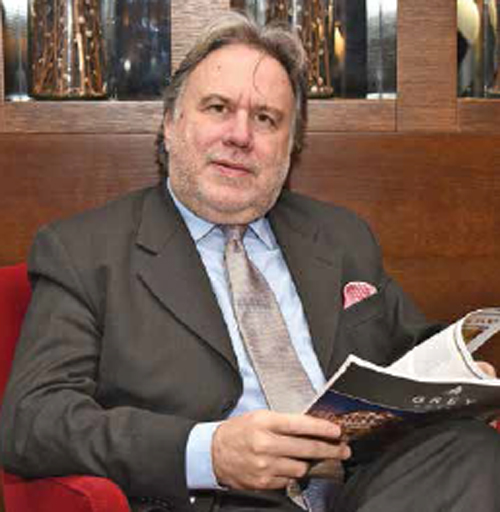We consider Serbia to be one of the pillars of stability in the Western Balkans and that is why we fully support its candidacy in the European Union. We will be helping as much as we can in the opening of the new chapters of these negotiations, says George Katrougalos, Greek alternate Minister for Foreign Affairs, responsible for European Affairs and International Economic Relations
On the recent forum that hit the record of participations of both Greek and Serbian companies it was mentioned that bilateral exchanges between Serbian and Greek enterprises have approached the number of 500. However, this is just a start, says George Katrougalos, Greek Alternate Minister for Foreign Affairs, with whom we discussed further improvements of bilateral relations between Serbia and Greece, Serbian EU integration process and the encouraging results of the Greek economy.
How do you evaluate importance of good bilateral relations between Serbia and Greece in terms of regional stability and EU integration process?
— We have, as you know very good bilateral relations on both the political and economic level. However, we think that they can always be better and that is why I am here. We are going to have a number of dignitaries even on the highest level that will visit Serbia. In the next days a representative of the Greek parliament will also visit Serbia. In the upcoming year we can expect the visit of our Prime Minister . We consider Serbia to be one of the pillars of stability in the Balkans and that is why we fully support its candidacy in the E. U. We will be helping as much as we can in the opening of the new chapters of these negotiations.
How Greece fares today in terms of economic and political stability and what the reshuffle of the government brings in?
— We are now back to economic growth after the period of deep crisis which had important repercussions on the social level. Greece faced a record number of unemployed people, especially among the young generations. Now we are back to growth – there is a forecast made by international organizations that we can expect growth of at least +2,7% next year. Our main intention is to make this development fair so that the gains of the growth will not go just to some minority of the population. but to all of them. As for the reshuffle of the government, our goal is to enforce homogeneity of the government and to give a new impetus to this effort.
How do you see the future of the EU, having in mind the possible outcomes of the elections in France and Germany and ongoing migrant crisis?
— I think that E. U. is facing now a dilemma: either they are going to continue the same policies of austerity or they are going back to the fundamendals of the European social model. I think that the first choice is an impasse, which has been reflected in the recent elections and referendums – from Italy to Brexit. However, there is alienation of the European citizen vis-à-vis European integration, not because it is not a noble dream. The majority of the European citizens are supporting this dream of European Unity, but they are reacting to the mix of policies. That is why, in my opinion, it is imperative to abandon this neoliberal orthodoxy and to reorient ourselves to a social unity.
How these developments are affecting EU integration process and the fate of the EU candidate countries like Serbia?
— As I said, it is not something concerning some countries, but all of them. In Greece, we have been hit harder, because it is the very same mix of policies which are implemented throughout Europe. What is crucial here is solidarity and cohesion for any further extension. I think they are two very closely interrelated issues, so we must eliminate all factors of disunity or disruption of cohesion. so it could be managed to expand further.
Although both countries, Serbia and Greece, were in crisis for a long time, do you see today prospects for closer cooperation and in which fields?
— We have good relations, but they can become much, much better. We had this forum recently that hit the record of participations for both Greek and Serbian companies where it was mentioned that bilateral exchanges between Serbian and Greek enterprises have approached the number of 500. However, this is just a start and we must enhance political cooperation. There is also a room for improvement of economic cooperation. As for the fields of cooperation – we have many: tourism, food and beverage and the energy sector, which is one of the most crucial.
As you mentioned before, we can expect the visit of the PM Mr. Tsipras. What would be the major topics that Mr. Tsipras and Serbian leadership will discuss during his visit?
— The exact dates and the agenda must be confirmed through the diplomatic channels. But i am sure that it will include all of the topics that we have already discussed here: further strengthening of the close ties between Serbia and Greece and of course the European integrations perspectives of Serbia, with one of the main topics that might be discussed the overall stability in the area.
